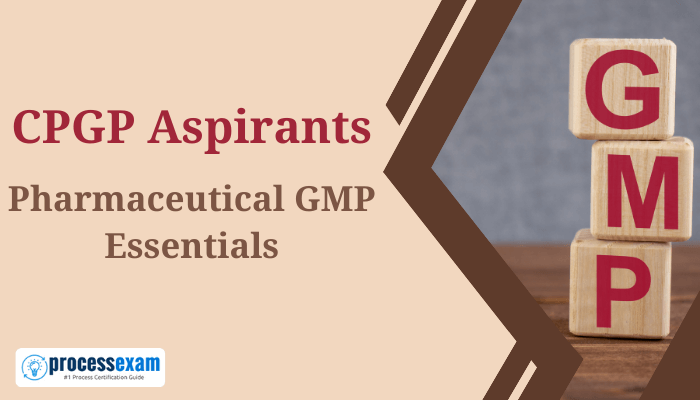
The pharmaceutical industry is one of the most regulated sectors globally, ensuring that products meet the highest quality, safety, and efficacy standards. At the heart of these regulations is Good Manufacturing Practice (GMP). Obtaining the ASQ Certified Pharmaceutical GMP Professional (CPGP) certification is a significant step for professionals looking to establish or advance their careers in this field.
This article will guide you through the basics of Pharmaceutical GMP and provide valuable insights for CPGP aspirants.
Pharmaceutical GMP: What You Need to Know?
Pharmaceutical Good Manufacturing Practices (GMP) are a set of regulations that manufacturers must follow to ensure their products are produced consistently and controlled according to quality standards. These practices cover all aspects of production from the raw materials, premises, and equipment to the training and personal hygiene of staff. Proper GMP is crucial because it ensures that products are made with the highest standards of safety and quality, minimizing risks associated with pharmaceutical production and distribution.
Significance of GMP in the Pharmaceutical Industry
The role of GMP is critical in the pharmaceutical sector as it helps to:
-
Quality Management: Establishing a comprehensive system of quality assurance and control to ensure products meet the required standards.
-
Personnel: Ensuring that all employees are qualified and properly trained.
-
Premises and Equipment: Maintaining clean and hygienic manufacturing areas with appropriately maintained equipment.
-
Documentation: Keeping detailed records of all manufacturing processes and procedures.
-
Production: Following approved processes and procedures for manufacturing.
-
Quality Control: Regular testing and quality control checks to ensure the product meets all quality standards.
-
Complaints and Recalls: Implementing systems for handling complaints and recalling products when necessary.
Becoming an ASQ Certified Pharmaceutical GMP Professional (CPGP)
The CPGP certification is offered by the American Society for Quality (ASQ) and is designed for professionals who want to demonstrate their expertise in Pharmaceutical GMP. The certification covers a broad range of topics and requires a deep understanding of GMP principles.
CPGP Exam Details:
-
Exam Format: The CPGP examination consists of 165 multiple-choice questions, of which 150 are scored and 15 are unscored pretest questions.
-
Duration: The total appointment time is four-and-a-half hours, with the actual exam lasting 4 hours and 18 minutes.
-
Language: The exam is offered in English only.
Key Topics Covered
-
Regulatory Agency Governance: Understanding global GMP regulations and guidelines.
-
Quality Systems: Implementing and maintaining a quality management system in the pharmaceutical industry.
-
Laboratory Systems: Ensuring laboratory compliance with GMP requirements.
-
Infrastructure: Facilities, Utilities, and Equipment: Managing facilities, equipment, and utilities to support GMP compliance.
-
Materials and Supply Chain Management: Overseeing the handling, storage, and distribution of materials and products.
-
Sterile and Nonsterile Manufacturing Systems: Managing production processes to ensure consistent quality.
-
Filling, Packaging, and Labeling: Ensuring that packaging and labeling processes meet regulatory requirements.
-
Product Development and Technology Transfer: Conducting validation and qualification activities to ensure processes produce consistent results.
Preparing Successfully for the CPGP Exam
Study Resources
-
ASQ’s Official Study Materials: Utilize ASQ's official resources and the CPGP Body of Knowledge (BoK) to guide your studies.
-
CPGP Practice Tests and Sample Questions: Regularly practice with CPGP practice tests and sample questions to familiarize yourself with the exam format.
-
Training Courses: Enroll in training courses specifically designed for CPGP exam preparation.
Tips for Success
-
Understand the Exam Format: Familiarize yourself with the structure and timing of the exam.
-
Develop a Study Plan: Create a study schedule that covers all the key topics and allows for regular review sessions.
-
Use Multiple Resources: Diversify your study materials to get a well-rounded understanding of the content.
-
Join Study Groups: Collaborate with other aspirants to discuss difficult concepts and share resources.
-
Stay Updated: Keep abreast of any changes in GMP regulations and guidelines.
How CPGP Certification Can Boost Your Career?
Obtaining the CPGP certification can significantly enhance your career by:
-
Career Advancement: CPGP certification can open doors to higher-level positions in the pharmaceutical industry.
-
Professional Recognition: It demonstrates your commitment to quality and your expertise in GMP.
-
Increased Knowledge: The certification process deepens your understanding of GMP principles and practices.
-
Higher Salary Potential: Certified professionals often command higher salaries due to their specialized knowledge.
Career Prospects and Salary Expectations
Obtaining the ASQ CPGP certification can significantly enhance your career prospects. Certified Pharmaceutical GMP Professionals are in demand in various roles, including quality assurance, regulatory affairs, production management, and compliance. The certification is highly regarded, and professionals can expect competitive salaries and opportunities for advancement.
Potential Job Roles:
-
Quality Assurance Manager
-
Regulatory Affairs Specialist
-
Production Manager
-
Compliance Officer
-
Validation Engineer
Salary Benefits of CPGP Certification: A Comparison
Salaries for CPGP Certified Professionals vary based on experience, location, and specific job roles. However, certification generally leads to higher earning potential. CPGPs with 10 years of experience make an average salary of $76k per year; compared to those without certification, who make approximately $66k (national average).
Continuous Professional Development
To maintain the CPGP certification, ASQ requires recertification every three years, which involves accumulating Professional Development Units (PDUs) through ongoing education and professional activities. This requirement ensures that professionals stay current with the latest advancements and changes in GMP standards and practices.
Conclusion
The ASQ Certified Pharmaceutical GMP Professional (CPGP) certification is a valuable credential for anyone looking to advance their career in the pharmaceutical industry. Understanding the basics of Pharmaceutical GMP is crucial for success in the CPGP exam and in your professional life. Following the guidelines and utilizing the resources provided can enhance your knowledge, demonstrate your expertise, and achieve your career goals. Whether you are just starting or looking to advance your career, the CPGP certification is a step in the right direction.
